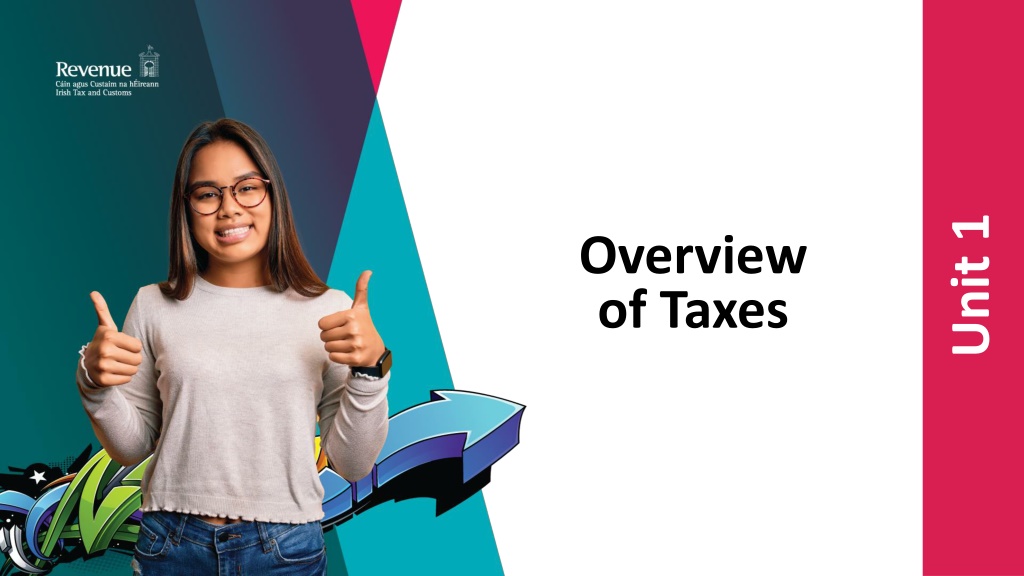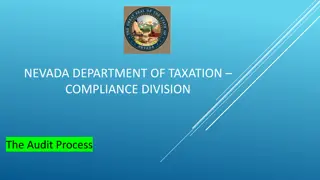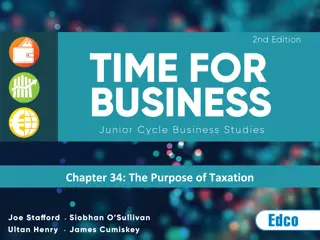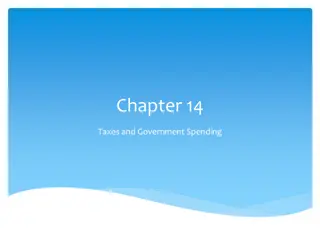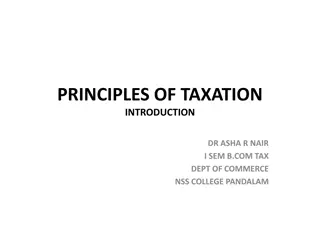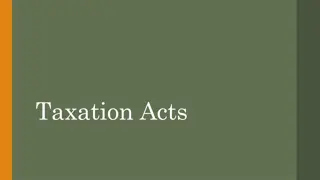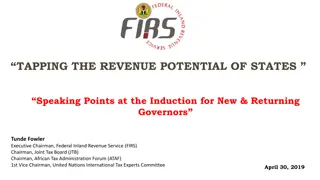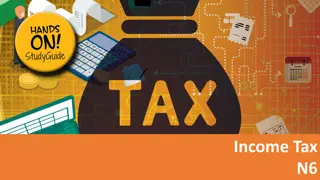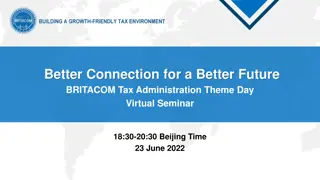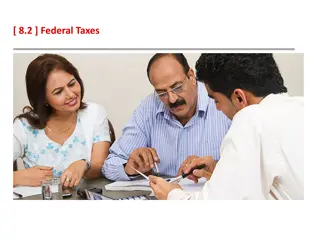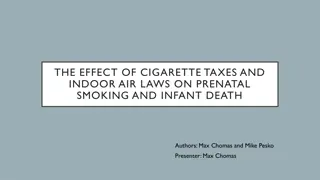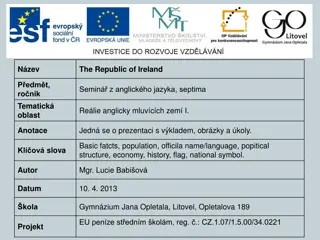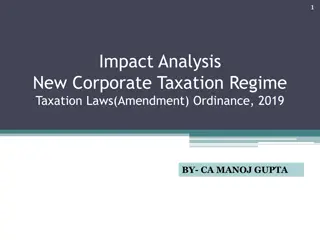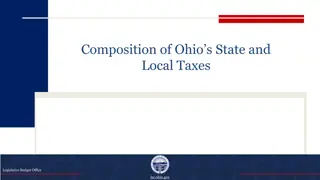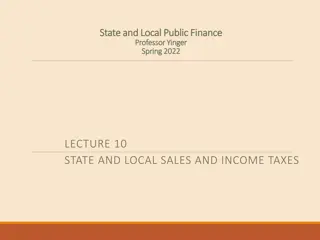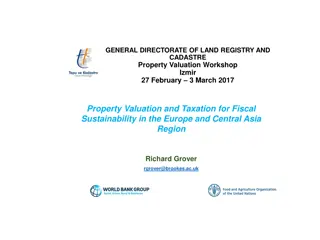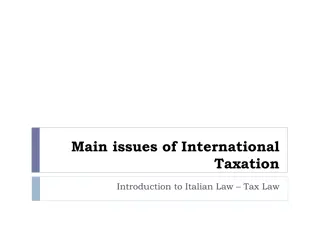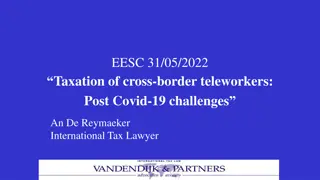Understanding Taxes: An Overview of Taxation Principles and Collection in Ireland
This content covers the fundamental aspects of taxation, including its definition, purpose, principles (fairness, certainty, efficiency, convenience), and tax collection in Ireland by the Revenue Commissioners. It explores key concepts related to taxation and aims to enhance understanding of tax systems and processes.
Download Presentation

Please find below an Image/Link to download the presentation.
The content on the website is provided AS IS for your information and personal use only. It may not be sold, licensed, or shared on other websites without obtaining consent from the author. Download presentation by click this link. If you encounter any issues during the download, it is possible that the publisher has removed the file from their server.
E N D
Presentation Transcript
Unit 1 Overview of Taxes
Pre course questionnaire Please complete the pre course questionnaire via the following link: https://www.surveymonkey.com/r/PVPCQLW 2
Learning Intentions At the end of the unit, I will be able to: 1 Explain the term taxation and outline the purpose of a tax system 2 Understand the reasons for paying taxes Outline the types of taxes collected by the Revenue Commissioners from individuals and businesses Identify the main areas of government income (revenue) and expenditure 3 4 3
Activity 1 What is taxation? 4
Activity 1 Taxation Definition 5
Activity 2 What is the purpose of taxation? 6
Principles of Taxation Fairness Certainty Efficiency Convenience 7
Principles of Taxation Fairness Taxes levied should be based on a person s / firm s ability to pay Certainty People should know how much tax they have to pay, when the tax must be paid and howthe tax will be collected Adam Smith 1723-1790 Scottish Philosopher & Economist. Author of The Wealth of Nations 8
3 Principles of Taxation Convenience There should be a simple process to pay and collect taxes owed Efficiency The cost to collect taxes should be kept to a minimum Adam Smith 1723-1790 Scottish Philosopher & Economist. Author of The Wealth of Nations 9
Tax Collection Who collects taxes on behalf of the government in Ireland? 10
Revenue Commissioners In 1922, Michael Collins (Minister for Finance in the Provisional Government) made the decision that led to the establishment of the Office of the Revenue Commissioners in 1923. It combined the two parts of the existing British Tax and Customs Administration to form Revenue Since 1923 the headquarters have been based at Dublin Castle 11
Revenue Commissioners at a Glance Over 30 Revenue Offices in Ireland Approx. 6,800 staff 61% of staff are female 63,000+ staff training days p.a. 12
Our Mission To serve the community by fairly and efficiently collecting taxes and duties and implementing customs controls Revenue Commissioners Mission Statement 13
Revenue Commissioners Statement of Strategy 2023 - 2025 Our Vision To be a leading tax and customs administration, trusted by the community, and an employer of choice Service for Compliance Confront Non- Compliance 14
Activity 3 Identify sources of income for the Irish government Taxation Other Sources 15
Government Income from Taxation Income Tax Value Added Tax (VAT) This is a tax charged on goods and services paid by the end consumer A tax on an employee s income The current rates are 20% and 40% Customs Duty Universal Social Charge (USC) A tax paid on goods and services purchased from outside the European Union A tax on employee s income 16
Government Income from Taxation Excise Duty Capital Acquisitions Tax (CAT) A tax charged on a gift or an inheritance A tax used to discourage consumption and is paid on mineral oils (petrol, diesel, kerosene), tobacco products and alcohol Capital Gains Tax (CGT) A tax paid on the profit made on the sale of an asset Deposit Interest Retention Tax (DIRT) A tax paid on interest earned on savings 17
Government Income from Taxation Local Property Tax (LPT) Stamp Duty This is a tax paid on the written documents that transfer ownership of land and buildings It is also a tax on cardholders on financial cards, charge cards and credit cards This is a self-assessed tax based on the market value of residential property in Ireland Vehicle Registration Tax (VRT) A tax paid when registering a new vehicle and vehicles imported to Ireland Corporation Tax A tax paid on company profits 18
Activity 3 Government Income 2022 Sales of goods and services 4.3 billion Other 1.8 billion Investment income 0.6 billion Social contributions 19.8 billion Taxes 88.9 billion 19
Activity 4 On what does the government spend its income? 20
Activity 5 On what does the government spend its income? In 2023 government expenditure is expected to be 99.8 billion. Working in pairs / groups use a ranking ladder to rank the areas of expenditure shown below, from the most to least important. Discuss the reasons for your ranking decisions. Once you have done this, decide how much money you will allocate to each area. 1. Social Protection Health Education Justice 2. 3. 4. Debt Servicing & EU Payments Other Government Department Expenditure 5. Agriculture Transport 6. 7. 21 8.
Website 22
Activity 5 Government Expenditure Were there any government allocations that surprised you? Were there any disagreements about the allocation? 23
Activity 5 Government Expenditure What public services would you be prepared to give up if you could pay less tax? What impact could these tax cuts have? 24
Activity 6 Unit 1- Overview of Taxes local property tax taxation Government vehicle registration tax capital gains tax corporation tax Universal expenditure excise duty charge Social carbon tax stamp duty value added tax government revenue capital acquisition tax income tax sugar sweetened drinks tax deposit interest retention tax 25
Learning Journal Complete your Learning Journal for Unit 1 - Overview of Taxes 26
